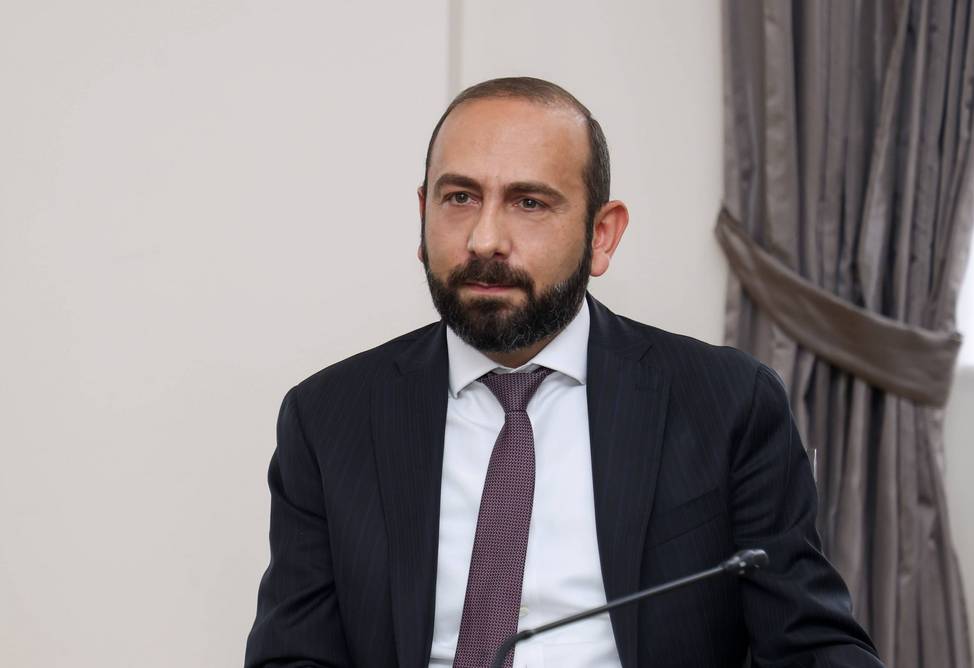Pashinyan expects foreign ministers to implement instructions
15.04.2019,
17:57
Armenian Prime Minister Nikol Pashinyan shared today his expectations from a meeting of Armenian and Azerbaijani foreign ministers in Moscow.

YEREVAN, April 15. /ARKA/. Armenian Prime Minister Nikol Pashinyan shared today his expectations from a meeting of Armenian and Azerbaijani foreign ministers in Moscow. Speaking to journalists he said he expects the instructions given to the foreign ministers to be implemented.
He said the essence of the instructions is to hold discussions on the issues that had been discussed in Vienna and bring the positions of the sides closer.
Azerbaijani and Armenian foreign ministers Elmar Mammadyarov and Zohrab Mnatsakanyan met today with Russian Foreign Minister Sergey Lavrov to discuss the prospects for the Nagorno-Karabakh settlement.
The closed-door meeting took place in the wake of the talks between Azerbaijani President Ilham Aliyev and Armenian Prime Minister Nikol Pashinyan in Vienna on March 29.
The ministers were then joined by OSCE Minsk Group Co-Chairs Igor Popov (Russia), Stephane Visconti (France) and Andrew Schofer (USA).
The Vienna meeting between Aliyev and Pashinyan in Austria’s capital was their fourth personal meeting but the first official negotiations on the Karabakh conflict.
The most important outcome of the Vienna meeting was the parties’ willingness to continue direct dialogue on a peaceful settlement.
The Nagorno-Karabakh conflict erupted into armed clashes after the collapse of the Soviet Union in the early 1990s as the predominantly Armenian-populated enclave of Azerbaijan sought to secede from Azerbaijan and declared its independence backed by a successful referendum.
On May 12, 1994, the Bishkek cease-fire agreement put an end to the military operations. A truce was brokered by Russia in 1994, although no permanent peace agreement has been signed. Since then, Nagorno-Karabakh and several adjacent regions have been under the control of Armenian forces of Karabakh. Nagorno-Karabakh is the longest-running post-Soviet era conflict and has continued to simmer despite the relative peace of the past two decades, with snipers causing tens of deaths a year.
On April 2, 2016, Azerbaijan launched military assaults along the entire perimeter of its contact line with Nagorno-Karabakh. Four days later a cease-fire was reached. -0---
He said the essence of the instructions is to hold discussions on the issues that had been discussed in Vienna and bring the positions of the sides closer.
Azerbaijani and Armenian foreign ministers Elmar Mammadyarov and Zohrab Mnatsakanyan met today with Russian Foreign Minister Sergey Lavrov to discuss the prospects for the Nagorno-Karabakh settlement.
The closed-door meeting took place in the wake of the talks between Azerbaijani President Ilham Aliyev and Armenian Prime Minister Nikol Pashinyan in Vienna on March 29.
The ministers were then joined by OSCE Minsk Group Co-Chairs Igor Popov (Russia), Stephane Visconti (France) and Andrew Schofer (USA).
The Vienna meeting between Aliyev and Pashinyan in Austria’s capital was their fourth personal meeting but the first official negotiations on the Karabakh conflict.
The most important outcome of the Vienna meeting was the parties’ willingness to continue direct dialogue on a peaceful settlement.
The Nagorno-Karabakh conflict erupted into armed clashes after the collapse of the Soviet Union in the early 1990s as the predominantly Armenian-populated enclave of Azerbaijan sought to secede from Azerbaijan and declared its independence backed by a successful referendum.
On May 12, 1994, the Bishkek cease-fire agreement put an end to the military operations. A truce was brokered by Russia in 1994, although no permanent peace agreement has been signed. Since then, Nagorno-Karabakh and several adjacent regions have been under the control of Armenian forces of Karabakh. Nagorno-Karabakh is the longest-running post-Soviet era conflict and has continued to simmer despite the relative peace of the past two decades, with snipers causing tens of deaths a year.
On April 2, 2016, Azerbaijan launched military assaults along the entire perimeter of its contact line with Nagorno-Karabakh. Four days later a cease-fire was reached. -0---



